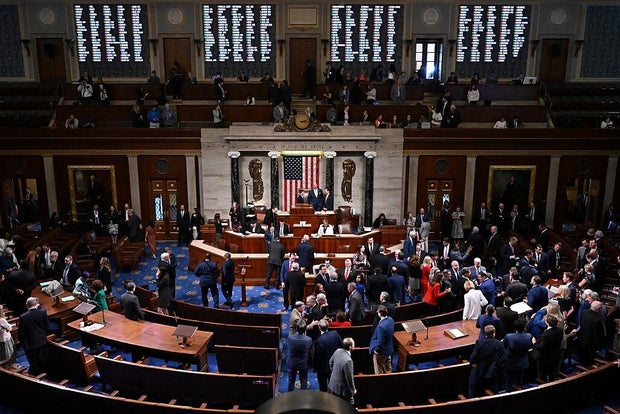Washington — The House on Thursday passed the signature piece of legislation of President Trump’s second term, approving a massive bill that includes trillions of dollars in tax and spending cuts while ramping up funding for defense and the administration’s immigration agenda.
The lower chamber voted 218 to 214 to approve the measure, with two Republicans — Reps. Thomas Massie of Kentucky and Brian Fitzpatrick of Pennsylvania — joining all Democrats in opposing the bill. The Senate passed the legislation, dubbed the “big, beautiful bill,” earlier this week. The House vote tees up President Trump to sign the bill as early as Friday, coinciding with the July 4 holiday.
The vote came after a marathon overnight session that saw GOP leaders overcome internal opposition to advance the bill, paving the way for final passage. Republican members who balked at many of the changes the Senate made to the legislation eventually relented and voted to pass it.
House Democratic Leader Hakeem Jeffries tried to delay the inevitable by speaking on the floor for 8 hours and 44 minutes, setting the record for the longest House speech in U.S. history. He called out Republicans for the bill’s deep cuts to Medicaid and food assistance programs, highlighting the Americans who he said would suffer because of the bill.
Before the vote, Speaker Mike Johnson said the bill will “make this country stronger, safer and more prosperous than ever before, and every American is going to benefit from that.”
“We’ve had spirited debate, we’ve had months of deliberation, and now we are finally ready to fulfill our promise to the American people,” Johnson said. “That’s what we are doing today.”
The nonpartisan Congressional Budget Office estimates the bill would add $3.4 trillion to federal deficits over the next 10 years and leave millions without health insurance, due to the cuts to Medicaid and programs under the Affordable Care Act. It would also dramatically increase funding for immigration enforcement, a key priority for Republicans and the president.
GOP opposition melts away
The final vote came after House GOP leadership scrambled Wednesday and into the wee hours Thursday to shore up support for the measure ahead of a key procedural vote.
Although Johnson spent weeks pleading with his Senate counterparts not to make any major changes to the version of the bill that passed the lower chamber by a single vote in May, the Senate made a number of tweaks that irked House members on a number of fronts — from its cuts to Medicaid to its impact on the deficit. Johnson acknowledged that the Senate bill’s changes “went a little further than many of us would’ve preferred,” though he repeatedly urged that the final product was largely what the House had signed off on in May.
The Senate-passed bill includes steeper Medicaid cuts, a higher increase in the debt limit and changes to the House bill’s green energy policies and the state and local tax deduction. Other controversial provisions that faced pushback in both chambers, including the sale of public lands in nearly a dozen states, a 10-year moratorium on states regulating artificial intelligence and an excise tax on the renewable energy industry, were stripped from the Senate bill before heading back to the House.
Potential holdouts, including moderates and members of the conservative House Freedom Caucus, met with Mr. Trump on Wednesday as the White House pressured House Republicans to vote for the bill.
The vote on the key procedural hurdle began around 9:30 p.m. Wednesday and didn’t wrap up until about 3:20 a.m. Thursday. Five House Republicans initially voted no on the vote setting the rules for debate on the measure, which would have been enough to tank the vote. But the vote remained open as GOP leaders worked to shore up support, allowing lawmakers to change from no to yes.
Johnson told reporters that Mr. Trump was “directly engaged” with skeptical members to get them onboard.
“Members wanted to hear certain assurances from him about what’s ahead, what the future will entail, and what we’re going to do next, and all of that,” Johnson said. “And he was very, very helpful in that process.”
Mr. Trump ramped up the pressure over Truth Social as a handful of Republican holdouts didn’t appear to be budging, declaring: “FOR REPUBLICANS, THIS SHOULD BE AN EASY YES VOTE. RIDICULOUS!!!”
“What are the Republicans waiting for??? What are you trying to prove??? MAGA IS NOT HAPPY, AND IT’S COSTING YOU VOTES!!!” Mr. Trump wrote shortly after midnight.
The House ultimately voted 219 to 213 to advance the bill in a key victory for Republican leaders, who won the support of about a dozen GOP opponents to the rule. And when the vote finally came to an end, Fitzpatrick was the sole Republican opposed. He would also vote against final passage.
Johnson told reporters that the breakthrough came amid help from the president, along with lengthy listening sessions with the bill’s opponents, “making sure that their concerns were addressed.”
“A lot of people had to take the time to thoroughly go through the Senate’s changes to our bill and that’s fine,” Johnson said. “That was necessary to get them to yes.”

